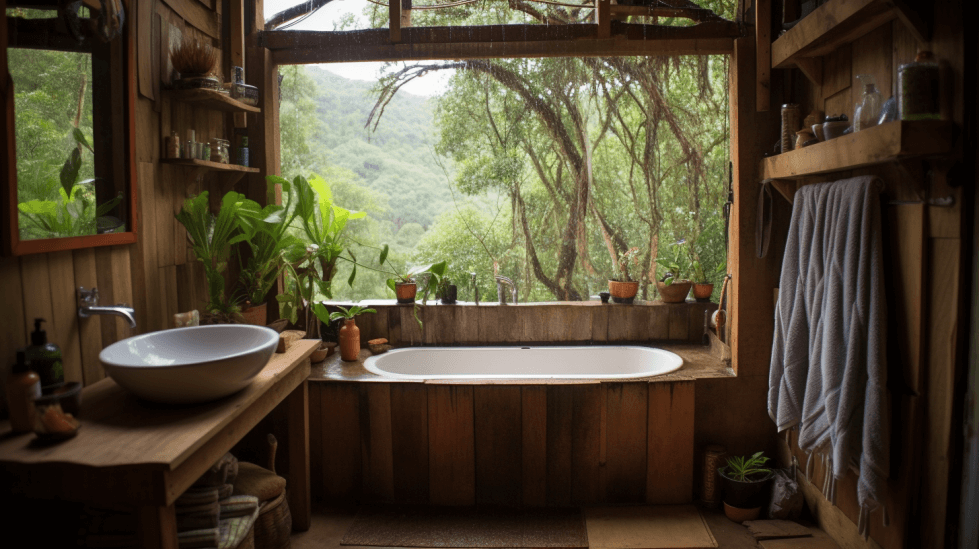Off Grid Bathroom Ideas
As someone who’s passionate about sustainable living, I have become increasingly interested in off-grid bathroom ideas. Off-grid bathrooms are perfect for those looking to minimize their environmental footprint and live in harmony with nature. These innovative solutions not only save water but also provide an opportunity for resourceful living.

One of the key components of an off-grid bathroom is selecting the right toilet option. There are various toilet systems available, each with their own benefits and drawbacks. Another important element in off-grid bathroom design is choosing the appropriate shower system, as this can have a significant impact on water usage and overall sustainability. Finally, the layout and overall aesthetic of the washroom plays a crucial role in creating a comfortable and functional space.
Key Takeaways
- Choosing an off-grid toilet system is essential to sustainable living
- Selecting an environmentally friendly shower option can greatly reduce water usage
- A well-designed layout enhances the comfort and functionality of an off-grid washroom
Understanding Off-Grid Bathrooms
As someone who is interested in off-grid living, I find it essential to understand the basics of off-grid bathrooms and how they differ from conventional ones. In an off-grid bathroom, the main differences lie in the sanitation systems and indoor plumbing used.
Firstly, I would like to address the sanitation systems that are commonly used in off-grid living scenarios. One popular option is septic systems, which collect waste and water from toilets, sinks, and tubs without relying on a public sewage connection. This type of system works well for those who plan to stay in one place off the grid and have access to a water connection. Another option is composting toilets, which break down human waste into nutrient-rich compost without the need for water or sewage connections.
Regarding indoor plumbing, off-grid living often requires alternative solutions for providing water, heating, and disposal of waste. Solar panels, propane, and wood stoves are popular options for these purposes. For example, water can be heated on a stove and pumped to the shower using a camping shower pump, like the one in the Dry Cabin Bathroom by Alaska Abode.
In off-grid living, it’s crucial to find innovative solutions for daily activities, including bathroom needs. By implementing alternative sanitation systems and indoor plumbing, I can embrace the off-grid lifestyle while maintaining a clean and functional bathroom.
Off-Grid Toilet Options
Composting Toilets
Composting toilets have become one of the most popular off-grid toilet options. They are an environmentally-friendly choice and require no water supply to operate. A composting toilet uses natural processes to break down fecal matter and urine into a nutrient-rich compost. By separating the solid waste from the liquid with a urine diverter, unpleasant odors are minimized, making the experience more pleasant for everyone. A mixture of peat moss, sawdust, or coconut coir is added to improve the composting process.
Some of the advantages of using a composting toilet include:
- Easy installation
- Eco-friendly solution
- No need for external water supply
- Minimal odors
Septic Systems
For those off-gridders who have access to water, a septic system can be a reliable option. Septic tanks collect and store wastewater, allowing it to be treated as it decomposes. Installing a septic system doesn’t require much maintenance, but it is crucial to periodically inspect and clean the tank. Some benefits of a septic system are:
- Operates similar to a regular toilet system
- Requires minimal maintenance
- Handles greywater and blackwater in one system
Portable Toilets
Portable toilets offer a relatively simple solution for off-grid living, especially in small spaces or when you need easy access to a toilet during road trips or camping. These are stand-alone units that don’t require any installation, and most portable toilets feature a waste tank that can be easily emptied when needed. However, they usually don’t have the capacity to handle a large volume of waste, so they might not be suitable for long-term use.
Traditional and Dry Toilets
Traditional toilets, such as dry toilets or pit latrines, are an option for those looking for a more familiar and straightforward design. Dry toilets operate similarly to regular toilets but use a bucket of water instead of flushing for waste disposal. For added comfort, consider adding a toilet seat and toilet paper to your dry toilet setup.
Toilet Extras
To enhance the off-grid toilet experience, consider incorporating some extras. For example, you can have a warm water supply for washing with a solar-heated water tank or use a cold-water dispenser for cleaning purposes. Additionally, ensure you have a proper waste disposal system in place for toilet paper and other sanitary products.
By exploring these off-grid toilet options, you can find a suitable solution that caters to your needs and priorities while living off the grid. Remember to take into consideration factors like water supply, waste management, and installation requirements when evaluating your choices.
Off-Grid Shower Options
Solar Powered Showers
I’ve always been fascinated by the use of solar energy, especially in off-grid setups. A solar-powered shower is an excellent option for an off-grid bathroom. It harnesses the power of solar panels to heat water for your shower, which can be stored in a solar shower bag. This way, you can have a hot shower even in remote locations. Using solar panels is not only eco-friendly, but it is also efficient since they provide a renewable source of energy.
Outdoor and Portable Showers
An outdoor shower is not only practical for off-grid setups, but it can also be a refreshing and invigorating experience. Some off-grid dwellers opt for a simple bucket shower, while others prefer a more sophisticated system with a garden hose or water hose connected to a shower head. If you need even more mobility, a portable shower can be quite useful. You can take these showers with you wherever you go, making them perfect for camping, backpacking, or emergency situations.
Other Shower Systems
There are many other off-grid shower systems to choose from, such as tankless water heaters and showers powered by water pumps. A tankless water heater can provide a consistent supply of warm water for your shower, while a water pump can help maintain sufficient water pressure and control water flow. Depending on your location and climate, you might need to consider other factors like a hot water heater for a cold climate or a reliable water source for your shower system.
Shower Extras
When planning your off-grid shower, there are additional features to consider for making your experience more comfortable, such as a proper shower door to maintain privacy, and a system to control water temperature. The right shower head can also make a big difference; some provide better water pressure, while others help you conserve water. Assessing your water needs and availability is crucial in determining the best off-grid shower system for you.
Washroom Design and Layout
Small Space Solutions
In my experience with off-grid bathroom ideas, I have found that innovative and space-saving solutions are essential for small spaces like dry cabins or off-grid cabins. A popular choice is the old-fashioned outhouse, which can be creatively incorporated into a tiny home or tiny house bathroom layout. For those who prefer an indoor bathroom, a built-in propane burner can be used to heat water for showers, while a portable toilet provides a compact and convenient option.
Another great small space solution is customizing a shower pan to fit the specific dimensions of the bathroom, ensuring optimum use of the available space. Combining clever storage options, like wall-mounted shelves or vanity units, can further enhance the functionality and aesthetic of your off-grid bathroom.
Materials and Extras
Considering the right materials for your off-grid bathroom is crucial for both longevity and ease of maintenance. In my opinion, Carrara marble tiles offer an excellent balance of aesthetics and durability, while wood accents can create a cozy, rustic ambiance. Additionally, a compact wood stove is an ideal choice for heating small off-grid bathrooms when temperatures dip.
To upgrade your off-grid bathroom experience, consider investing in extras like free shipping for hard-to-find materials or fixtures. Keep in mind that in such settings, a flat surface for personal belongings is always a welcome addition.
Final Thoughts

As I’ve explored various off-grid bathroom ideas, it’s clear that there is no one-size-fits-all solution. With a little planning, however, it’s possible to find the perfect solution that suits your unique needs and lifestyle. Personally, I believe that a composting toilet is a great option for waste management, as it provides an environmentally friendly and sustainable approach. Plus, the good news is that it can be used for daily use without any major issues.
Now, when it comes to bathing, a warm shower is definitely a luxury that most of us don’t want to give up. The good thing is that there are several ways to incorporate this into your off-grid bathroom setup. For instance, a simple solar-heated water system can be a great way to have warm showers without consuming electricity. Additionally, rainwater harvesting can be an excellent choice for ensuring a continuous water supply, making it the right choice in certain situations.
In my opinion, finding a better way to efficiently use resources while enjoying the comforts of a modern-day bathroom is one of the biggest problems off-grid living presents. However, taking the time to research and select the ideal solution that fits your requirements can make all the difference. From composting toilets to solar showers, there are a myriad of options available that are not only eco-friendly but also cost-effective.
As a final suggestion, I’d like to emphasize the importance of selecting materials and technologies that are in line with your off-grid goals. Remember, just because something seems like a good idea initially, doesn’t mean it’s the best thing for your situation. Always weigh the pros and cons and make informed decisions based on your specific needs and preferences. With the right choices and a little creativity, living off the grid doesn’t have to mean sacrificing comfort or hygiene in your bathroom.
Frequently Asked Questions

How can I build an off-grid shower system?
An off-grid shower system usually relies on propane or solar energy to heat water. To build one, first determine the water source, whether that is a nearby stream, a water tank, or collected rainwater. Then, choose a portable propane or solar-powered water heater and connect it to a showerhead. Make sure to use a catch basin or drainage system to manage gray water properly. Find more information on off-grid shower systems here.
What are some popular off-grid composting toilet options?
Several popular options for off-grid composting toilets include self-contained composting toilets, which hold waste in a built-in compartment, and central composting toilets, where the waste is collected in a separate location. These toilets are typically low-maintenance, odor-free when properly managed, and produce compost that can be used as fertilizer. Learn more about the different types of off-grid toilet options here.
Can I have a flush toilet without access to plumbing?
Having a flush toilet without access to plumbing is challenging but possible. One option is a dry flush toilet, which uses a system of cartridges to wrap and seal waste, allowing for easy disposal. Another option is a vacuum-assisted toilet, which requires a smaller water supply and utilizes vacuum pressure to flush waste into a storage tank. Both of these alternatives can be more expensive and complicated than other off-grid options, so consider your specific needs before choosing this route.
How do I design an outhouse and shower combo?
When designing an outhouse and shower combo, you have to take into account factors such as space, privacy, and proper drainage. You can build two separate rooms for the toilet and shower or combine them into a single space. In either case, consider using a composting toilet to manage waste, and a propane or solar-powered shower system. Look at these off-grid bathroom ideas for inspiration on how to design your outhouse and shower combo.
What are some modern outhouse designs with showers?
Modern outhouse designs with showers often incorporate eco-friendly and space-saving features like composting toilets, solar or propane-powered shower systems, and proper ventilation. Some designs also focus on using reclaimed or sustainable building materials, blending functionality with a visually appealing aesthetic. Explore these ideas for a variety of modern outhouse designs with showers.
Are there alternatives to septic tanks for off-grid bathrooms?
Yes, there are alternatives to septic tanks for off-grid bathrooms. Composting toilets can effectively manage waste without requiring a septic system. Another option is a greywater recycling system, which treats and reuses water from sinks and showers for irrigation or flushing toilets. However, these systems may still require proper permitting and adherence to local regulations.








